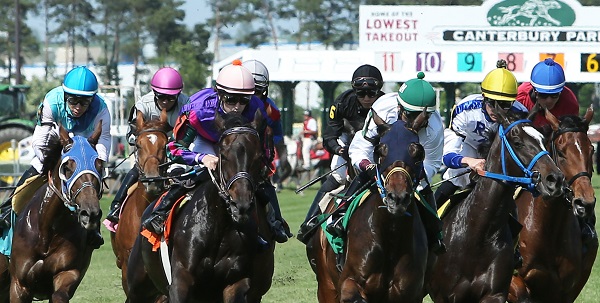BY JIM WELLS
Everywhere you looked on Thursday there were warning signs _ on the television weather channels, the overhead monitors on Minnesota’s highways, the weather pages of local newspapers.
Warning signs indicating dangerous heat indexes exceeding 110, suffocating humidity and diminished air quality due to the impact of those factors were being hammered into the consciousness of entire communities.
Canterbury Park runs races in the heat, wind and rain but not in this case. Management cancelled the Thursday night card after an analysis of weather predictions and the possible impact on the horses stabled at the track.
Horses run in hot weather all of the time, in Texas and Arizona. The heat itself is not the issue that most concerned management after consultation with chief state veterinarian Lynn Hovda. Her concern had chiefly to do with predicted humidity levels and the lack of a breeze, both factors in the decreased ability of horses to release heat through sweating.
Hovda explained that horses have much less relative skin surface on which to sweat and release the heat in their bodies than do humans. In addition, their gastrointestinal systems weigh several hundred pounds, in actual and relative terms considerably greater than those of humans. Now add the prospect of wet, sticky air without a breeze and the impact on the equine body becomes enormous.
“If they can’t evaporate their sweat, the heat builds up internally, affecting especially the brain,” she said. “They begin to get muscle cramping, twitches and tremors, the signs of distress. Then the neurological issues begin and the animal falls down.”
The entire process of heat accumulation, of course, is exacerbated when a horse runs, exponentially when there is high humidity and lack of wind.
“If it’s a dry heat we can help them out with water and ice,” Hovda added. “But with humidity, the ability to evaporate the sweat is diminished and the heat builds. If there is not a breeze, which helps evaporation, it is even worse.”
Horsemen hate to lose racing days, but their concerns about the cancellation of Thursday’s card were alleviated in many cases by management’s assurance it would replace the lost day with an additional card scheduled for Sept. 1.
In addition to additional precautions on Thursday, many horsemen were taking additional steps in their barns to help their animals better endure the hot, sticky conditions.
Barns accumulate a great deal of heat so it is not unusual to find that many if not most trainers place large fans in the shedrows.
Trainer Francisco Bravo tries to complete training for his horses as early as possible on days such as Thursday. “That helps us escape some of the heat,” he said, “and we increase the amount of electrolytes we give them and salt to get them to drink more water and stay hydrated.”
In addition, Bravo likes to keep his barn as clean as possible to cut down on the number of flies that typically are at their worst during heat spells and pester horses constantly during such times, a source of irritation that does nothing to keep a horse cool.
Still, he was not so sure that it was necessary to cancel Thursday’s card.
“From where I come from (Oklahoma), this is a normal day,” he said. “If horses are in good physical shape they should be able to weather this kind of heat,” he added.
Some trainers believe that horses in some respects aren’t much different than most of the animal kingdom, that they eventually adjust to the conditions in which they live.
Canterbury Park Hall of Fame trainer Doug Oliver had a young horse entered Thursday and was OK with the decision to cancel the card. “I’m sure glad they cancelled,” he said. “I didn’t want to run this one under these conditions.”
Oliver has a fan for each one of his stalls and keeps it running much of the summer, and when the weather turns hot steps up the attention he gives his horses.
“We make sure to feed them plenty of electrolytes,” he said. He also says that
the suddenly extreme weather probably has a greater effect on horses at Canterbury than at places where the weather is hot and humid much of the time.
“We’ve had a pretty cool summer most of the time,” he said. “When we get something like this is probably affects horses here a lot more than those are live in it all summer.”
Not that Oliver and Bravo don’t know something about the heat. Oliver trains in Phoenix from nearly the time Canterbury ends its meet until it begins a new one. Bravo has trained in Texas and Oklahoma much of his life.
